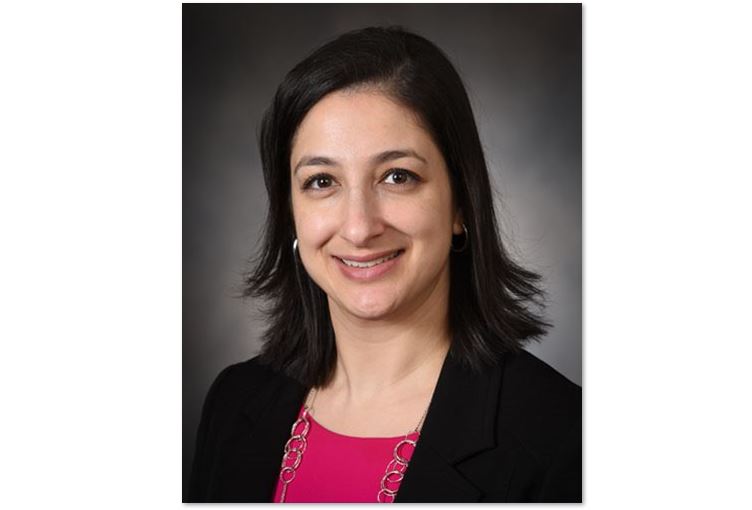Dr. Fareesh Hobbs Kanga Leads Successful Transition of Clerkship to Virtual Learning
When students at the University of Kentucky were sent home last spring as a precaution early in the COVID-19 pandemic, Fareesh Hobbs Kanga, MD, faced a pair of significant challenges.
Dr. Kanga, psychiatry clerkship director and assistant professor of psychiatry at the University of Kentucky College of Medicine, had two courses approaching that needed to be converted to virtual learning, and on a tight deadline.
One was MD 813 Behavioral Basis of Medicine (BBM), a course for first-year students that covered the basics of diagnoses, underlying basis of psychiatric illnesses, and psychiatric treatment. It was set to begin April 6, and the COVID-19 pandemic already had exhausted many of its resources. Faculty who assisted with instruction were pulled in for COVID-related tasks in clinic, thus forced to record their lectures. Plus, material was taught from home, not a typical lecture hall, adding a layer of difficulty with the technology.
However, the more challenging task for Dr. Kanga was transitioning the third-year clerkship that also was set to restart April 6. This course requires in-person instruction and “authentic clinical experiences,” according to the Liaison Committee on Medicine Education (LCME). And at the time when medical students were set to return to campus, in-person clinical experiences were severely limited due to pandemic-related restrictions.
“I knew this would be a test because an entirely online psychiatry clerkship had never been done before,” Dr. Kanga said.
Mere days before the clerkship was set to restart, Dr. Kanga swiftly drafted a plan and presented it to the UK College of Medicine. Much of the plan for the clerkship aimed at incorporating students into as many real-life telehealth sessions as possible. Residents from the UK College of Medicine Department of Psychiatry invited medical students into their telehealth appointments at the outpatient clinic, and the National Alliance on Mental Health (NAMI) Lexington allowed students to join Zoom support groups for clients with mental illness. Dr. Kanga also collaborated with Eastern State Hospital, which piloted virtual teaching rounds.
Dr. Kanga was creative with her course’s direct observations, during which students must have an attending psychiatrist observe them while they take a history and perform a mental status exam on a patient. Because of COVID-19 students were not allowed to hold face-to-face visits with patients.
“Instead, several of our wonderful psychiatry residents agreed to be standardized patients, like actors, for an evaluation on Zoom,” Dr. Kanga said. “With the help of Dr. Todd Cheever, who provided a patient script, and Jodi Smith, who coordinated all of the schedules, the residents portrayed the scripted patient while the student performed a history and discussed the mental status exam with an attending present.
“In the end, all the students on that rotation were able to complete this mandatory task.”
Meanwhile, all didactic lectures in the course were moved to Zoom. Students completed modules from the Association of Directors of Medical Student Education in Psychiatry (ADMSEP), which allowed them to watch a diagnostic psychiatric evaluation, answer questions about interviewing, take history and examine patients, and work through diagnosis and treatment. Dr. Kanga also held extra sessions and meetings, and students completed their psychiatry shelf exam at home on their computers with their phones set up so that instructors could proctor remotely.
The result was a viable alternative that allowed continuous learning for third-year students during the pandemic.
“Third-year clerkships are pivotal points in medical education because this is when our students are truly immersed in the clinical experiences,” Charles Griffith, MD, vice dean for education, said. “Dr. Kanga went above and beyond so that her students didn’t see their medical education interrupted during the pandemic.”
Dr. Kanga credited her team of faculty, staff, and learners who helped her along the way, including Brian Higgins, PhD, who helped with exam preparation and moderated lectures for the BBM course when she was in clinic, as well as Jodi Smith, her clerkship coordinator who kept up with scheduling and student requirements. Dr. Kanga said she also was grateful for all of her curriculum team members, academic technologists, and her psychiatry residents, fellows, and students.
She thanked her daughters, Ameera and Niya, and her husband, Stephen Hobbs, MD, associate professor of radiology and medicine at the UK College of Medicine, who were “so incredibly supportive” of her, “despite significant disruption in their own lives and all the other stresses of a pandemic.”
“I have always been a proponent of teamwork, but this experience solidified that a thousand-fold,” Dr. Kanga said. “Teaching in medicine is not a one-person effort; it is truly a collaboration of so many different people’s expertise. I am so lucky to have my teams.”
